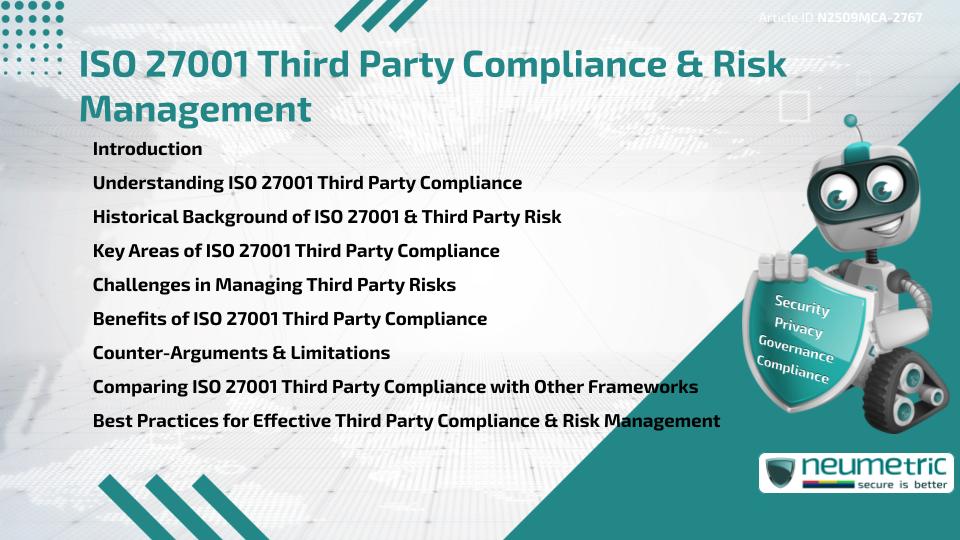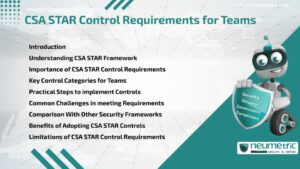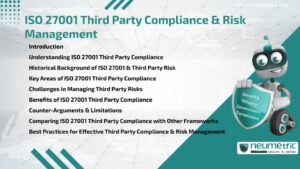Table of Contents
ToggleIntroduction
The ISO 27001 Third Party Compliance Requirements ensure that Organisations properly manage Risks associated with external Vendors, Suppliers & Partners. Since third parties often process or access Sensitive Data, ensuring their Compliance is a vital part of an Information Security management system [ISMS]. By implementing strong ISO 27001 Third Party Compliance practices, businesses can safeguard information assets, reduce Risks & demonstrate accountability to regulators & clients.
Understanding ISO 27001 Third Party Compliance
ISO 27001 Third Party Compliance refers to the measures Organisations must adopt to ensure that their external Partners adhere to Information Security requirements. This includes contractual obligations, Security Assessments & ongoing monitoring of Vendors. Compliance ensures that data handled by third parties is protected with the same rigor as internal systems, thereby closing potential gaps in security.
Historical Background of ISO 27001 & Third Party Risk
ISO 27001 was first introduced in 2005 & has since become the leading global Standard for Information Security. While earlier versions focused primarily on internal processes, subsequent updates emphasized Third Party Risk Management. This shift reflected the growing reality that supply chain Vulnerabilities, Vendor breaches & outsourced services represent some of the largest Risks to Organisations today.
Key Areas of ISO 27001 Third Party Compliance
The ISO 27001 Third Party Compliance Framework typically covers the following areas:
- Due diligence: Evaluating third parties before engagement through Risk Assessments & background checks.
- Contracts & agreements: Including Data Protection clauses, confidentiality requirements & Compliance obligations.
- Access Control: Limiting Vendor access to only what is necessary for service delivery.
- Monitoring & audits: Conducting regular reviews, assessments & audits of Vendor practices.
- Incident Response: Ensuring third parties have clear reporting protocols for data breaches.
- Termination procedures: Defining processes for safely handling data at the end of a relationship.
Challenges in Managing Third Party Risks
Organisations often face challenges in ensuring ISO 27001 Third Party Compliance, including:
- Limited visibility into Vendor operations.
- Resource constraints for conducting thorough assessments.
- Global supply chains with varying regulatory requirements.
- Vendors resistant to audits or contractual obligations.
- Difficulty in aligning Vendor practices with organizational Policies.
Benefits of ISO 27001 Third Party Compliance
Implementing strong ISO 27001 Third Party Compliance practices provides Organisations with significant advantages:
- Reduces Risks of breaches originating from external Vendors.
- Builds trust with Customers & Stakeholders by demonstrating accountability.
- Provides legal & regulatory assurance in case of audits.
- Improves operational resilience by standardizing Vendor security practices.
- Enhances overall ISMS effectiveness through supply chain integration.
Counter-Arguments & Limitations
Some argue that enforcing Compliance on third parties can be costly & strain business relationships. Others point out that even with strict controls, Organisations cannot completely eliminate Risks from external Partners. While these points are valid, the purpose of ISO 27001 Third Party Compliance is Risk reduction, not Risk elimination & it provides a structured approach for minimizing exposure.
Comparing ISO 27001 Third Party Compliance with Other Frameworks
Other frameworks, such as NIST Cybersecurity Framework & SOC 2, also emphasize Third Party Risk Management. However, ISO 27001 Third Party Compliance offers a globally recognized, certifiable approach that integrates Vendor management directly into the ISMS. This integration makes it especially valuable for Organisations operating internationally or handling sensitive Client data.
Best Practices for Effective Third Party Compliance & Risk Management
Organisations can improve ISO 27001 Third Party Compliance by following Best Practices such as:
- Creating a Vendor Risk Management program aligned with ISO 27001 requirements.
- Standardizing contractual language for all Vendor agreements.
- Conducting regular Third Party Risk Assessments & audits.
- Using automation tools for monitoring Vendor Compliance.
- Training staff to recognize Risks related to Vendor relationships.
- Building strong communication channels with Vendors to encourage transparency.
Conclusion
The ISO 27001 Third Party Compliance Framework ensures Organisations manage Vendor Risks effectively. By embedding Third Party oversight into the ISMS, businesses can reduce Vulnerabilities, strengthen resilience & demonstrate accountability.
Takeaways
- ISO 27001 Third Party Compliance protects Organisations from Vendor-related Risks.
- Key areas include due diligence, contracts, monitoring & Incident Response.
- Challenges include limited visibility & global supply chain complexities.
- Benefits include Risk reduction, improved trust & stronger resilience.
FAQ
What is ISO 27001 Third Party Compliance?
It is the process of ensuring Vendors & Partners follow ISO 27001 Information Security requirements.
Why is Third Party Compliance important?
Because external Vendors often handle Sensitive Data & their security practices directly impact organizational Risk.
What areas are included in Third Party Compliance?
They include due diligence, contractual clauses, monitoring, Access Control & Incident Response.
What challenges do businesses face in Third Party Compliance?
Challenges include limited visibility into Vendor practices, cost & resistance from Vendors.
How does ISO 27001 compare to other frameworks?
ISO 27001 integrates Vendor Compliance into a certifiable ISMS, offering global recognition unlike some other frameworks.
Can Small Businesses apply ISO 27001 Third Party Compliance?
Yes, the Framework is scalable & can be adapted for Organisations of different sizes.
References
- ISO – ISO/IEC 27001 Information Security
- NIST – Cybersecurity Framework
- Council of Europe – Data Protection & Privacy
Need help for Security, Privacy, Governance & VAPT?
Neumetric provides organisations the necessary help to achieve their Cybersecurity, Compliance, Governance, Privacy, Certifications & Pentesting needs.
Organisations & Businesses, specifically those which provide SaaS & AI Solutions in the Fintech, BFSI & other regulated sectors, usually need a Cybersecurity Partner for meeting & maintaining the ongoing Security & Privacy needs & requirements of their Enterprise Clients & Privacy conscious Customers.
SOC 2, ISO 27001, ISO 42001, NIST, HIPAA, HECVAT, EU GDPR are some of the Frameworks that are served by Fusion – a SaaS, multimodular, multitenant, centralised, automated, Cybersecurity & Compliance Management system.
Neumetric also provides Expert Services for technical security which covers VAPT for Web Applications, APIs, iOS & Android Mobile Apps, Security Testing for AWS & other Cloud Environments & Cloud Infrastructure & other similar scopes.
Reach out to us by Email or filling out the Contact Form…





